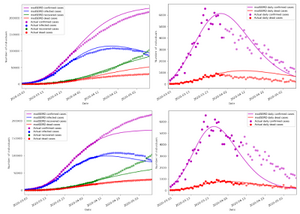Rza Hasanli, M.Sc.
Department of Scientific Computing
August 2021
Supervisor: Ömür Uğur (Institute of Applied Mathematics, Middle East Technical University, Ankara)
Co-Supervisor: Cansu Evcin (Department of Mathematics, Namık Kemal University, Tekirdağ)
Abstract
Due to recent evolution of the COVID-19 outbreak, accurate mathematical modelling to capture the dynamics of disease transmission is of vital importance. Since the availability and quality of data differs from region to region, it is very difficult to develop an accurate model from the global perspective. Nevertheless, local predictive models can be developed by collecting data from certain regions. In this thesis, a modified version of Susceptible-Exposed-Infected-Recovered-Dead (SEIRD) differential model is proposed for the analysis and forecast of COVID-19 spread. Parameter estimation of the model is the first step of analysis which is carried out by fitting the model to available data as good as possible in the sense of least squares. In second step of analysis, simulations are performed by using the optimal values of parameters. Through numerical simulations, the effects of public measures, such as isolation, social distancing on the dynamics of COVID-19 outbreak are observed. The model is applied for the COVID-19 outbreak in Turkey, Italy, and Spain. Time to reach the peak, total infected, recovered and dead cases are compared with real data and found to be in good agreement for all the countries.
Keywords: corona virus, parameter estimation, nonlinear regression, mathematical epidemic model, reproduction number
